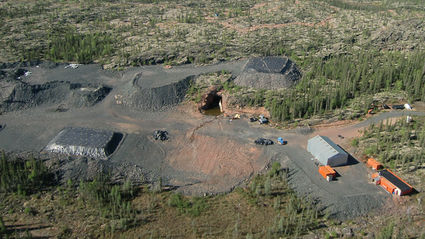Fortune refines new opportunity for Nico
North of 60 Mining News – September 21, 2018
Last updated 9/25/2020 at 6:38am

Fortune Minerals Ltd.
Over the past two decades, Fortune has advanced Nico from an in-house mineral discovery to a development stage project.
Fortune Minerals Ltd. Sept. 17 reported successful results from metallurgical test work aimed at verifying an upgraded and essentially arsenic-free cobalt concentrate can be produced from the Nico cobalt-gold-bismuth-copper project in Northwest Territories.
Over the past two decades, Fortune has advanced Nico from an in-house mineral discovery to a development stage project that includes a planned mine and concentrator in the Northwest Territories and refinery in Saskatchewan.
According to a feasibility study published in 2014, mineral reserves at Nico will support a 21-year mine that would average 1,615 metric tons of battery-grade cobalt; 41,300 ounces of gold; 1,750 metric tons of bismuth; and 265 metric tons of copper per year.
Fortune has already received its environmental assessment approval and the major permits needed to build the mine and refinery
Previous metallurgical work primarily focused on producing concentrates that would be processed into cobalt sulphate, gold, bismuth ingot and oxide, and copper precipitate at the refinery Fortune is planning to build in Saskatchewan. The company, however, said it has been contacted by several mining and refining companies interested in purchasing metal concentrates directly from the mine to be processed elsewhere.
To weigh building its own vertically integrated processing facility against selling Nico concentrates to third-party refineries, Fortune Minerals initiated a new round of metallurgical tests.
The company engaged Dundee Sustainable Technologies Inc., a Quebec-based company focused on the development of environment-friendly technologies for the treatment of materials in the mining industry, to carry out this metallurgical work.
Dundee Sustainable Technologies assessed the application of two processes – pyrolysis roast, a means of changing chemical composition with high temperatures, and arsenic stabilization, a patented process developed by Dundee to stabilize arsenic in an insoluble glass – on metal concentrates produced from the Nico project.
The objective of this work was to demonstrate that the arsenic and much of the sulfur can be removed from Nico concentrates and, creating products that are more attractive to the market and can be processed in existing metal recovery circuits operating around the world.
To accomplish this, Dundee used proven fluidized bed pyrolysis technology to roast metal concentrates in an oxygen deprived environment for selective removal and capture of arsenic and much of the sulfur from the contained sulfide minerals. The arsenic is then stabilized in a fused iron silicate glass that passes U.S. Environmental Protection Agency tests for environmentally safe disposal in a landfill.
The testing of this process demonstrated that the pyrolysis roast removed 99 percent of the arsenic, leaving less than 0.2 percent arsenic in the Nico bulk concentrate. Due to the removal of most the arsenic and sulfur, the metal grades in the cleaned concentrate increase by 20 to 30 percent.
Fortune said none of the cobalt, gold, or copper was lost with pyrolysis.
The new recovery flowsheet involves recovering the gold by cyanidation of the bulk concentrate prior to secondary flotation to produce separate cobalt and bismuth concentrates.
This would allow Fortune to control the gold stream by recovering the metal concentrates at the mine site, while producing separate cobalt and bismuth concentrates for sale to third party processors after arsenic, that is typically penalized, is removed.
Dundee's pyrolysis roast and arsenic stabilization processes have already been proven in pilot scale tests conducted for other gold and base metal projects as well as a development stage cobalt project with similar cobalt concentrate composition.
Additional work is in progress at Dundee Sustainable Technologies to optimize roast conditions and gold recovery, after completion of which, Fortune may complete a pilot plant from ores it has stockpiled to produce feasibility level economic analysis of the process.
Negotiations are also progressing with third-party refineries to obtain indicative prices for the sale of upgraded cobalt and bismuth concentrates with Fortune to remain in control of the gold process stream and revenues.
By eliminating the need to build a refinery in Saskatchewan, the new metallurgical process being studied is anticipated to have materially lower capital and operating costs for Nico. Fortune, however, said revenues would be comparatively lower for the sale of metal concentrates and there would be greater dependence on third party processors.
The engineering for the facilities in the Northwest Territories is essentially complete for the updated Technical Report to produce metal concentrates. A small gold recovery circuit may now be required in the mill if pryrolysis process technology is pursued for the project.
Fortune is evaluating the merits and conducting cost-benefit analysis of building a lower capital cost project that would produce concentrates versus a higher capital cost project that would produce value added cobalt chemicals in a purpose-built refinery.
The company will evaluate the best development option in consultation with potential strategic partners and in consideration of their downstream product and commercial objectives.
Fortune said it has more than 35 confidentiality agreements with companies interested in strategic partnerships to build and operate the Nico project.
–SHANE LASLEY













Reader Comments(0)